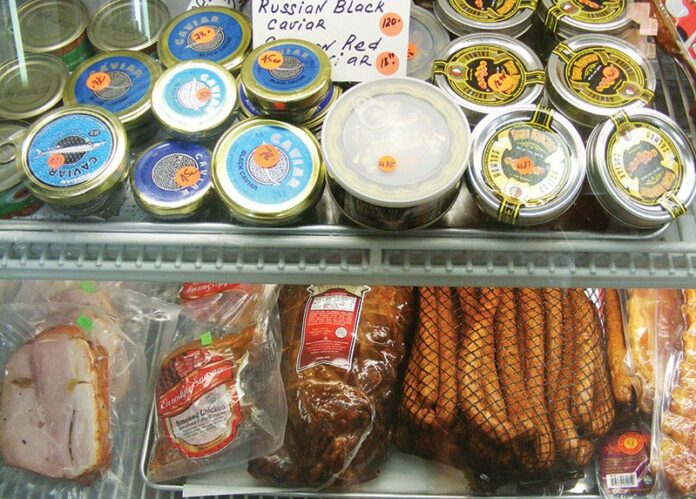Nostalgia is a powerful thing, especially when it involves food.
A Russian’s eyes light up at mention of
pilmeni. They’re a type of dumpling, but to Russians, pilmeni, cooked in water and eaten with vinegar or sour cream, are the stars of family gatherings and the symbol of a home left behind. And don’t even get the Scandinavians started on their herring.
Such sentimental nostalgia, as well as an appetite for foreign adventure, is one of the moving forces behind the aptly named European Food Store, the only shop in all three counties that sells products European transplants often crave. Opened in 2010 by Olga Rozhkova and her husband, Anatoli, the store is tucked away in a strip mall off Santa Rosa Avenue, and greets the visitor with humble announcements for hot pirozhki and rye bread.
Inside, substance trumps style. In the age of the Instagram foodie boom, when a sandwich must, above all, possess photogenic qualities and delis emphasize lavish, trendy décor, the European Food Store looks almost obsolete. Adorned only by a couple of nesting dolls and a lonely poster here and there, the store’s forte is its selection of imported foods absent from Whole Foods and its ilk.
“People drive here all the way from Eureka and Napa,” says Rozhkova with pride. “Up until San Francisco, we’re the only place around to sell the things they miss.”
What the German, Polish, Russian, Ukrainian, Hungarian and Scandinavian communities in the area miss is a large selection of frozen and fresh products imported from their home countries. One bestseller is German rye bread, imported frozen and baked on the spot. “People call and order ahead,” says Rozhkova.
In the meat section, German head cheese, kabanos (thin Polish sausage), Russian salume and Polish sausage—abundant with garlic and made in a Chicago factory, pose an alternative to the reign of prosciutto and bacon. Another fridge is devoted to the famous Finnish herring, Swedish brined anchovies, smoked fish and another popular purchase, piles of red and black caviar. Sold fresh by the pound or in sealed containers and often bought with flat, savory blini crêpes, the caviar makes for a festive feast no self-respecting Russian household can do without.
While some of the offerings like pasta, lentils or cookies may seem common, each product comes with an ethnic twist that people in the know seek out. Farmer’s cheese, used to make sirniki, a breakfast treat, is especially dry and rich, so the little cheesy pancakes turn out plump and hold together well. The sausages, less salty and smoky than average, are perfect for accompanying sauerkraut and complete a traditional German lunch.
Kvas, a popular Russian root beer, sold in huge dark bottles in the past and now available for sipping in slick miniature bottles, is not exactly your typical root beer. It has a deep wheat flavor and rich texture, fondly remembered by those who once bought it from a cart on the streets of Moscow or St. Petersburg. The fermented, probiotic beverage could classify it as Russian kombucha, but with triple the calories.
Shoppers with no European background are rare, but sometimes, as Rozhkova says, “people find us after they come back from trips to Europe and seek out flavors they tasted abroad.”
Rozhkova and her family emigrated from Siberia 16 years ago, and began their American success story in construction and house staging. During the recession, the family decided to open the store, and chose the remote location for its cheap rent.
“We wanted to close a few times, but the clients protested,” explains Rozhkova. “We serve as a community center, with a message board and a place to meet, read newspapers and talk to new people.” Indeed, one may come to the European Food Store for pirozhki, fresh savory pastries made by Cinderella Bakery in San Francisco, and leave with a phone number of a Hungarian-speaking nanny or a new friendship in the making.
Trying to survive with a small clientele, Rozhkova, soft-spoken and camera-shy, never stops innovating and tuning into popular demand. When customers asked for Mediterranean treats, she started importing rose water, rahat lokum (a jelly-like sweet from Turkey) and harissa, a North African chile paste. Ready for Christmas and Thanksgiving, the store is already decked with festive German stollen and chocolate souvenirs. Additionally, the store caters small community events with cheese and cold-cut boards, and Rozhkova is contemplating adding a takeaway option.
“Just come and ask,” she says, “and I’ll find out if I can bring it or make it.” This “just ask” attitude, so old-school and direct, is in many ways a metaphor for the goods sold here, and just like the food, its comfort and simplicity are irresistible.









